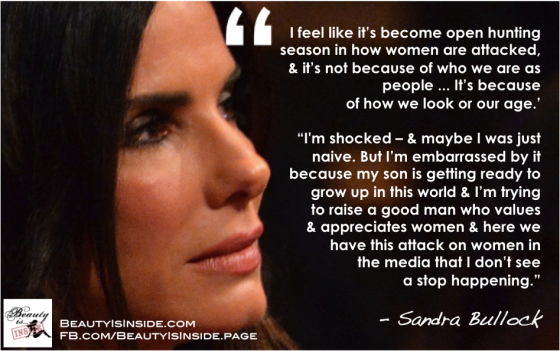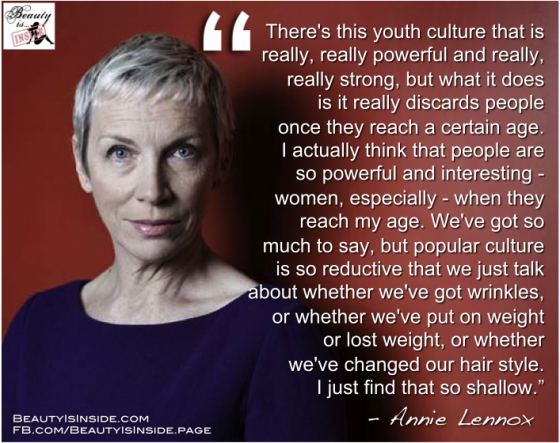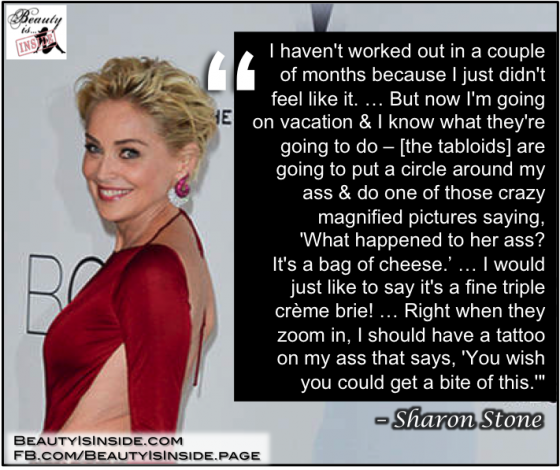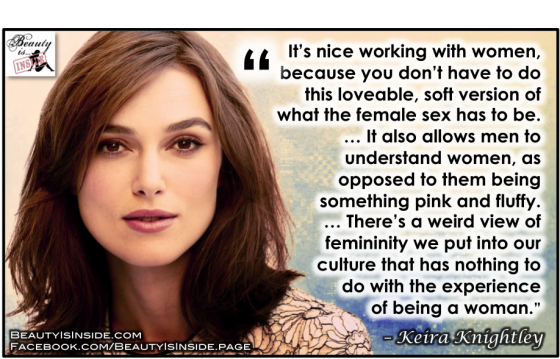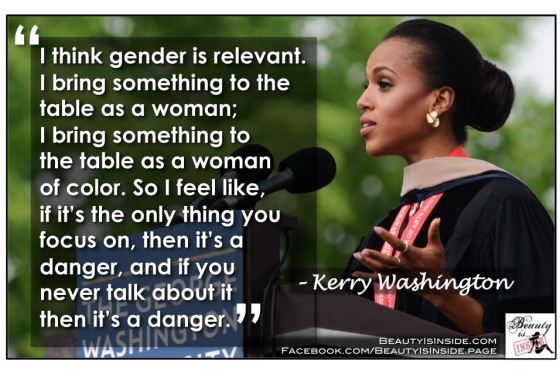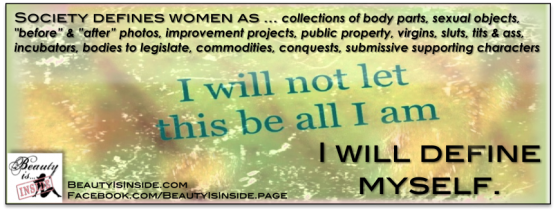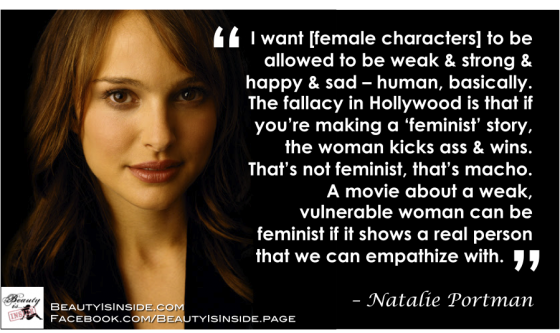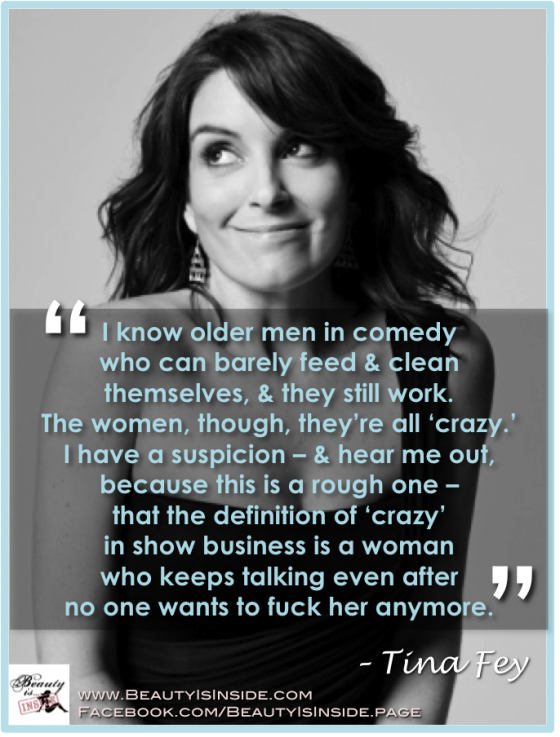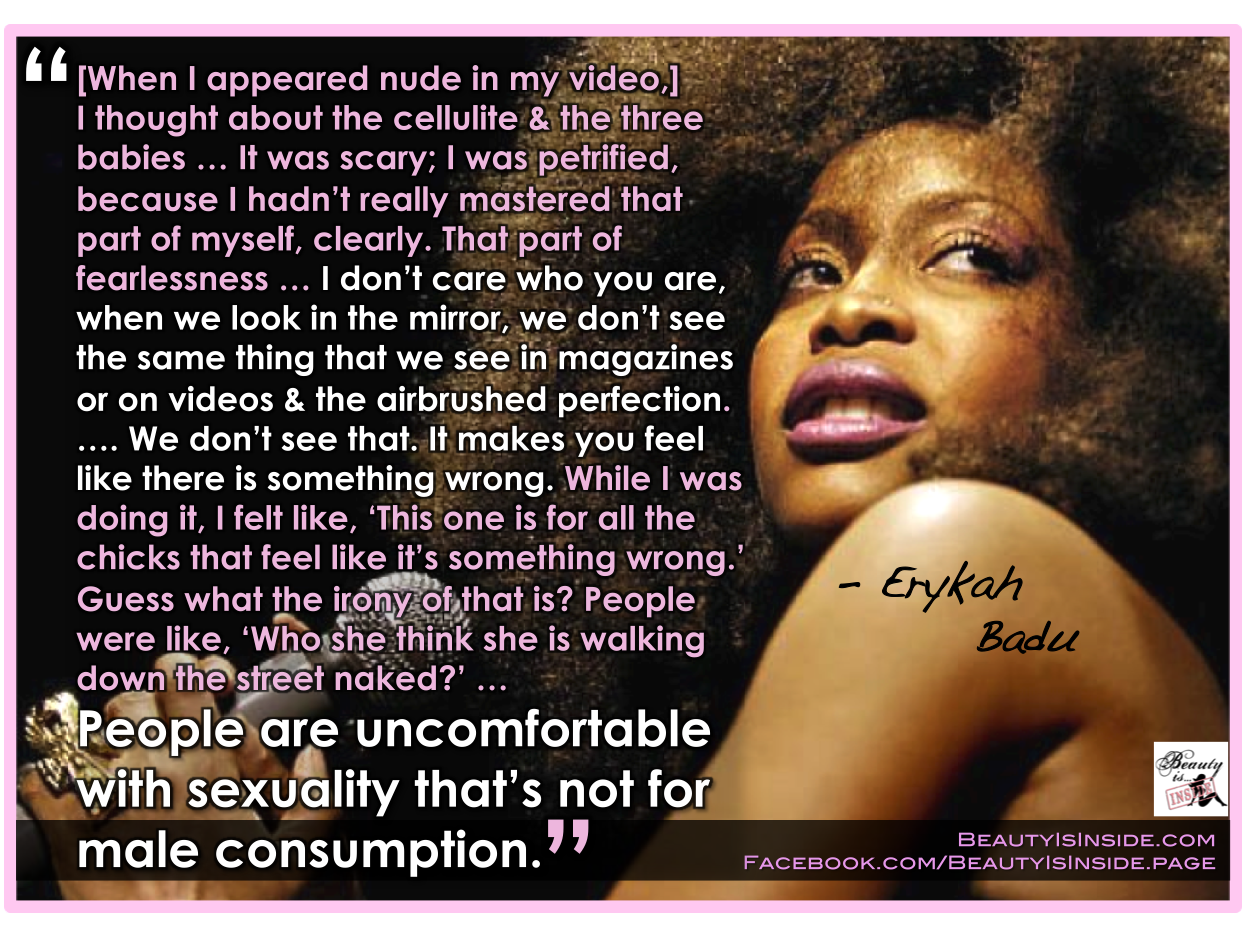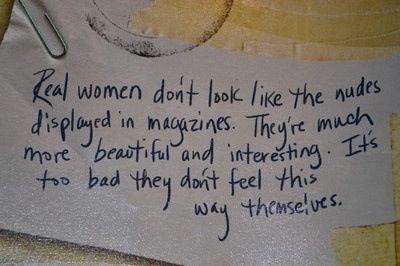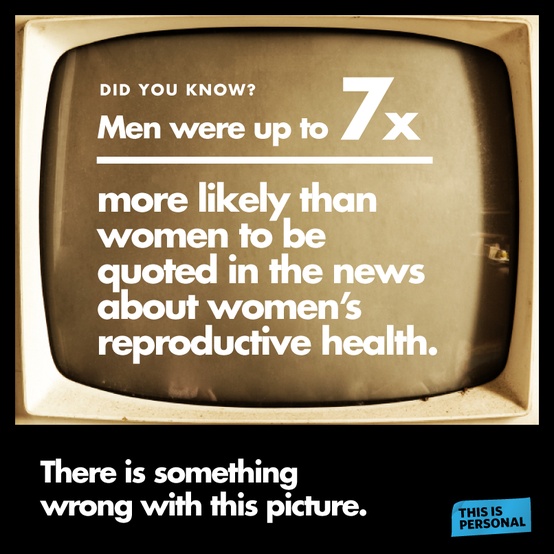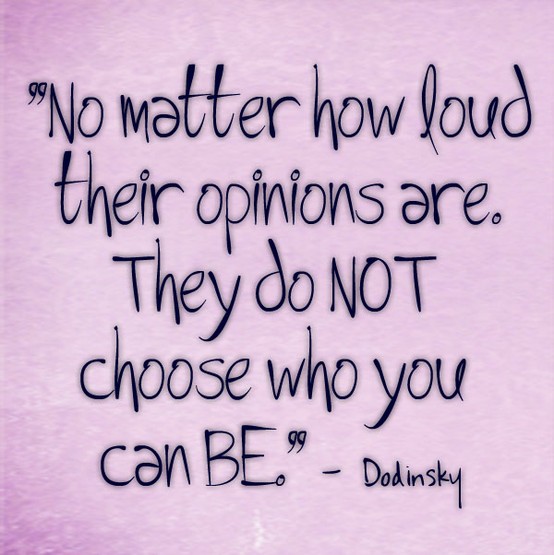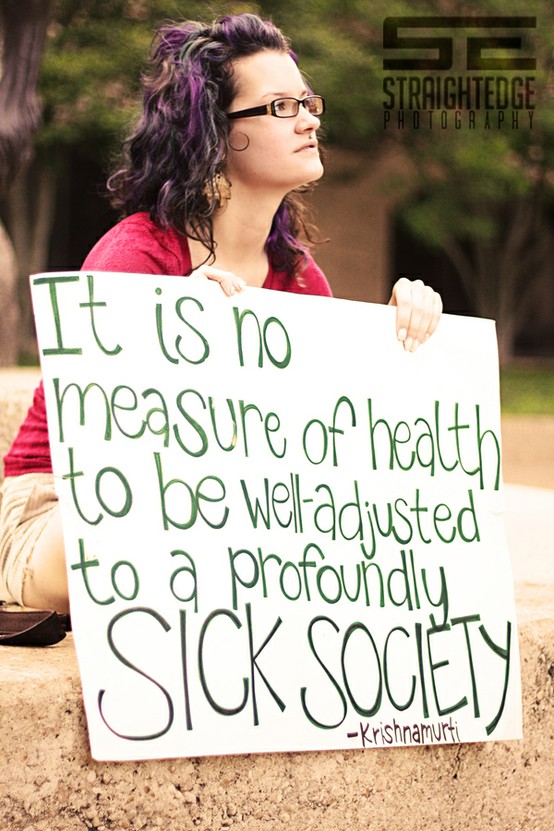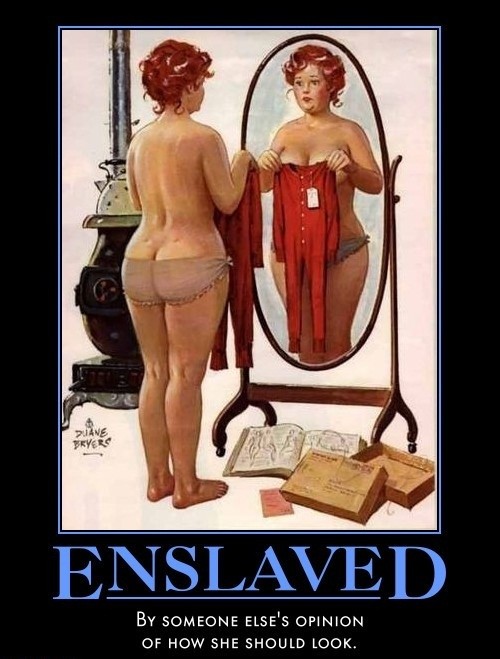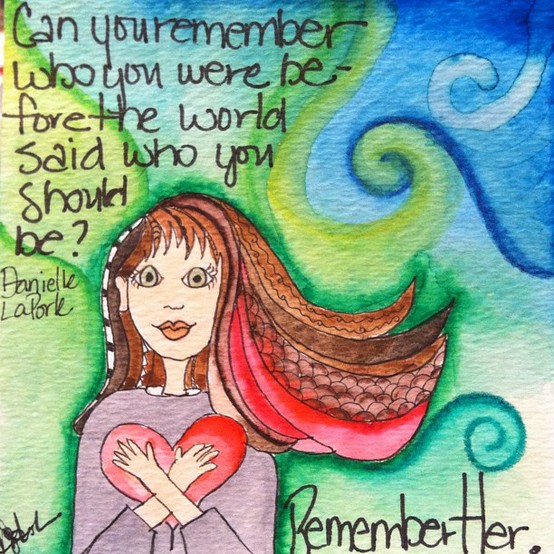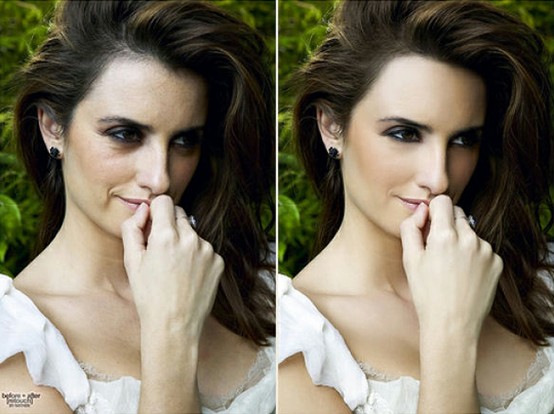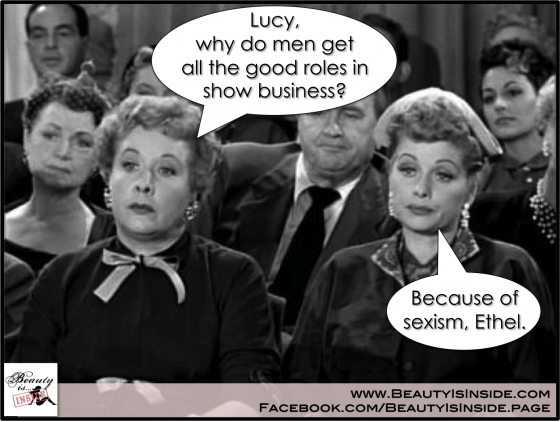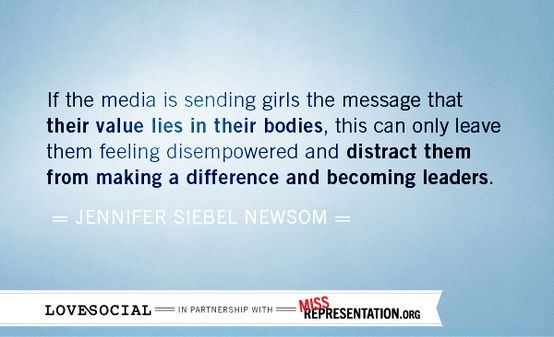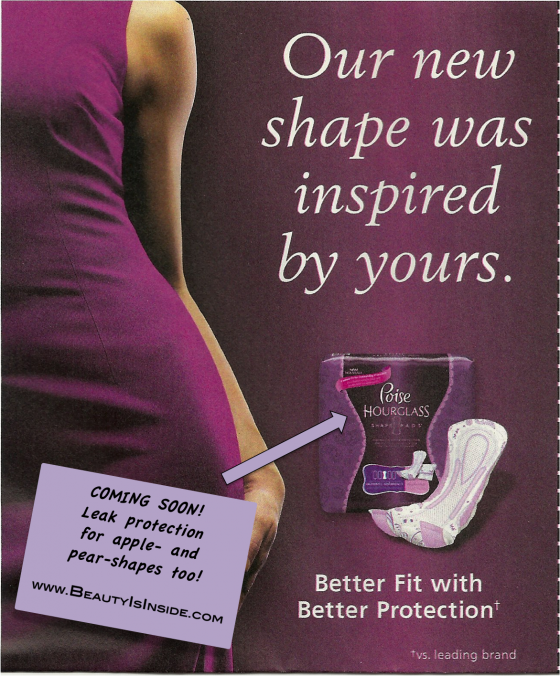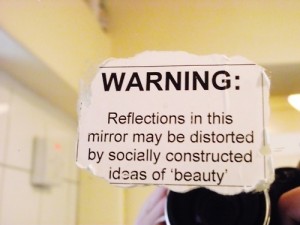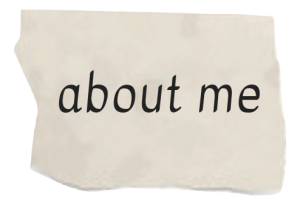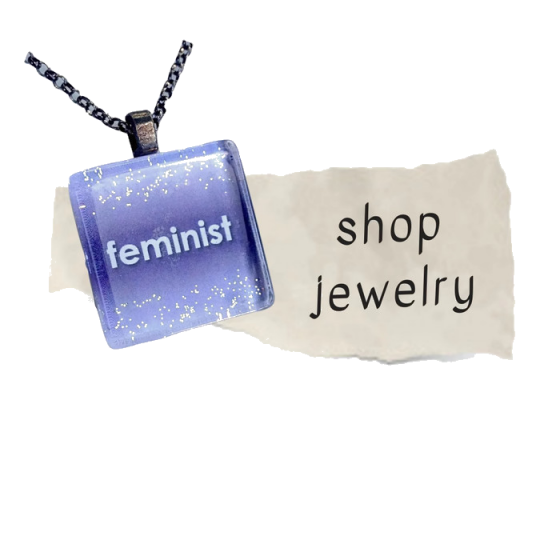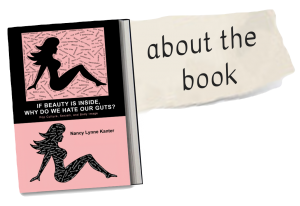 Body, it's me. Can we talk? It’s March 20th and spring has finally arrived. As spring fills the air, there are some things we can always count on-- flowers will bloom, birds will gleefully chirp, temperatures will rise, and the media will unleash its seasonal campaign begging me, pressuring me, DEMANDING me to declare war against you.
Magazines and commercials will be asking us if we’re “beach body ready.” They'll say it’s time to “melt away those love handles” and “get rid of those extra pounds.” Body, last time I checked, we have fat covering our bones, and extra cushioning around our tummy and hips-- never has this fat posed a threat to us or to anyone else for that matter, so why must it be so urgently destroyed? Why should we have to make ourselves smaller and smaller to satisfy an ideal of beauty that we never agreed to in the first place?
Advertisers will try to sell us products that will "eliminate unsightly stretch marks.” Body, last time I checked, we have stretch marks--winding, twisting, squiggly pale marks on our thighs, hips, breasts, butt, you get the picture! Despite what the media tells us, you and I know that these stretch marks signify our growth-- from a little girl into a woman. These stretch marks formed because I nourished you, fed you, allowed you to develop fully over the years. Why should we feel compelled to erase the very marks that make us human? Magazines incessantly mock celebrities who have cellulite. Body, last time I checked, we have cellulite. The generations of women before us had cellulite too-- it’s in our genes. My thighs have ripples and dimples, just like my mother’s thighs, and my grandmother’s thighs, and my great-grandmother’s thighs. When I look at our legs, the cellulite isn’t what strikes me. What strikes me is how our legs supported us and allowed us to stand tall throughout life’s most difficult challenges. Our legs, they did not buckle in times of hardship, heartbreak, and grief, no-- our legs kept us moving through life when it seemed impossible. Though we may receive ongoing harassment about the cellulite on our legs, our legs will continue to stand tall and stand up to unrealistic standards of beauty over and over again.
We see commercials for laser hair removal, waxing, and shaving products. Body, this is no secret-- we have hair. On our arms, on our legs, on our face, etc. Remember those boys who made fun of us in middle school for having hair on our bodies? Oh, the shame and insecurities we felt back then. Our dark hair carries our history and our heritage-- that is nothing to be ashamed of. Those boys, I hope they’ve matured over the years. I hope they don't humiliate their mothers, their sisters, and their daughters who grow hair on their faces and bodies. I hope they have learned to love and accept women as human beings and NOT Barbie dolls.
Body, the internet keeps telling us we need to “cleanse and detox.” If there is one thing we need to cleanse and detox, I think it is our mind. We need a 24-7 detox from the poisonous messages that have been bombarding us since we were young. Perhaps the weight we've needed to lose all along is the weight of society’s judgments surrounding our bodies and our worth.
Body, I want to thank you for never giving up on me. You’ve been there for me when I was not always kind to you. You don’t hold a grudge for all those years I hated you, starved you, overworked you, and treated you poorly. You’ve loved me unconditionally from the second we met, and it’s about time I returned that love. I want to cherish every moment we spend together-- basking in our imperfection, existing exactly as we are, and making no apologies. Happy Spring!
About the Author:
Brooke Scheinberg is a licensed social worker currently providing clinical therapy services at a substance abuse clinic in New Haven, CT. A graduate of the University of Maryland School of Social Work, Brooke hopes to use her personal and professional experience to help and inspire others on their journey to self-love.
Body, it's me. Can we talk? It’s March 20th and spring has finally arrived. As spring fills the air, there are some things we can always count on-- flowers will bloom, birds will gleefully chirp, temperatures will rise, and the media will unleash its seasonal campaign begging me, pressuring me, DEMANDING me to declare war against you.
Magazines and commercials will be asking us if we’re “beach body ready.” They'll say it’s time to “melt away those love handles” and “get rid of those extra pounds.” Body, last time I checked, we have fat covering our bones, and extra cushioning around our tummy and hips-- never has this fat posed a threat to us or to anyone else for that matter, so why must it be so urgently destroyed? Why should we have to make ourselves smaller and smaller to satisfy an ideal of beauty that we never agreed to in the first place?
Advertisers will try to sell us products that will "eliminate unsightly stretch marks.” Body, last time I checked, we have stretch marks--winding, twisting, squiggly pale marks on our thighs, hips, breasts, butt, you get the picture! Despite what the media tells us, you and I know that these stretch marks signify our growth-- from a little girl into a woman. These stretch marks formed because I nourished you, fed you, allowed you to develop fully over the years. Why should we feel compelled to erase the very marks that make us human? Magazines incessantly mock celebrities who have cellulite. Body, last time I checked, we have cellulite. The generations of women before us had cellulite too-- it’s in our genes. My thighs have ripples and dimples, just like my mother’s thighs, and my grandmother’s thighs, and my great-grandmother’s thighs. When I look at our legs, the cellulite isn’t what strikes me. What strikes me is how our legs supported us and allowed us to stand tall throughout life’s most difficult challenges. Our legs, they did not buckle in times of hardship, heartbreak, and grief, no-- our legs kept us moving through life when it seemed impossible. Though we may receive ongoing harassment about the cellulite on our legs, our legs will continue to stand tall and stand up to unrealistic standards of beauty over and over again.
We see commercials for laser hair removal, waxing, and shaving products. Body, this is no secret-- we have hair. On our arms, on our legs, on our face, etc. Remember those boys who made fun of us in middle school for having hair on our bodies? Oh, the shame and insecurities we felt back then. Our dark hair carries our history and our heritage-- that is nothing to be ashamed of. Those boys, I hope they’ve matured over the years. I hope they don't humiliate their mothers, their sisters, and their daughters who grow hair on their faces and bodies. I hope they have learned to love and accept women as human beings and NOT Barbie dolls.
Body, the internet keeps telling us we need to “cleanse and detox.” If there is one thing we need to cleanse and detox, I think it is our mind. We need a 24-7 detox from the poisonous messages that have been bombarding us since we were young. Perhaps the weight we've needed to lose all along is the weight of society’s judgments surrounding our bodies and our worth.
Body, I want to thank you for never giving up on me. You’ve been there for me when I was not always kind to you. You don’t hold a grudge for all those years I hated you, starved you, overworked you, and treated you poorly. You’ve loved me unconditionally from the second we met, and it’s about time I returned that love. I want to cherish every moment we spend together-- basking in our imperfection, existing exactly as we are, and making no apologies. Happy Spring!
About the Author:
Brooke Scheinberg is a licensed social worker currently providing clinical therapy services at a substance abuse clinic in New Haven, CT. A graduate of the University of Maryland School of Social Work, Brooke hopes to use her personal and professional experience to help and inspire others on their journey to self-love.
Posts in category Media
An Open Letter to My Body on the First Day of Spring
 Body, it's me. Can we talk? It’s March 20th and spring has finally arrived. As spring fills the air, there are some things we can always count on-- flowers will bloom, birds will gleefully chirp, temperatures will rise, and the media will unleash its seasonal campaign begging me, pressuring me, DEMANDING me to declare war against you.
Magazines and commercials will be asking us if we’re “beach body ready.” They'll say it’s time to “melt away those love handles” and “get rid of those extra pounds.” Body, last time I checked, we have fat covering our bones, and extra cushioning around our tummy and hips-- never has this fat posed a threat to us or to anyone else for that matter, so why must it be so urgently destroyed? Why should we have to make ourselves smaller and smaller to satisfy an ideal of beauty that we never agreed to in the first place?
Advertisers will try to sell us products that will "eliminate unsightly stretch marks.” Body, last time I checked, we have stretch marks--winding, twisting, squiggly pale marks on our thighs, hips, breasts, butt, you get the picture! Despite what the media tells us, you and I know that these stretch marks signify our growth-- from a little girl into a woman. These stretch marks formed because I nourished you, fed you, allowed you to develop fully over the years. Why should we feel compelled to erase the very marks that make us human? Magazines incessantly mock celebrities who have cellulite. Body, last time I checked, we have cellulite. The generations of women before us had cellulite too-- it’s in our genes. My thighs have ripples and dimples, just like my mother’s thighs, and my grandmother’s thighs, and my great-grandmother’s thighs. When I look at our legs, the cellulite isn’t what strikes me. What strikes me is how our legs supported us and allowed us to stand tall throughout life’s most difficult challenges. Our legs, they did not buckle in times of hardship, heartbreak, and grief, no-- our legs kept us moving through life when it seemed impossible. Though we may receive ongoing harassment about the cellulite on our legs, our legs will continue to stand tall and stand up to unrealistic standards of beauty over and over again.
We see commercials for laser hair removal, waxing, and shaving products. Body, this is no secret-- we have hair. On our arms, on our legs, on our face, etc. Remember those boys who made fun of us in middle school for having hair on our bodies? Oh, the shame and insecurities we felt back then. Our dark hair carries our history and our heritage-- that is nothing to be ashamed of. Those boys, I hope they’ve matured over the years. I hope they don't humiliate their mothers, their sisters, and their daughters who grow hair on their faces and bodies. I hope they have learned to love and accept women as human beings and NOT Barbie dolls.
Body, the internet keeps telling us we need to “cleanse and detox.” If there is one thing we need to cleanse and detox, I think it is our mind. We need a 24-7 detox from the poisonous messages that have been bombarding us since we were young. Perhaps the weight we've needed to lose all along is the weight of society’s judgments surrounding our bodies and our worth.
Body, I want to thank you for never giving up on me. You’ve been there for me when I was not always kind to you. You don’t hold a grudge for all those years I hated you, starved you, overworked you, and treated you poorly. You’ve loved me unconditionally from the second we met, and it’s about time I returned that love. I want to cherish every moment we spend together-- basking in our imperfection, existing exactly as we are, and making no apologies. Happy Spring!
About the Author:
Brooke Scheinberg is a licensed social worker currently providing clinical therapy services at a substance abuse clinic in New Haven, CT. A graduate of the University of Maryland School of Social Work, Brooke hopes to use her personal and professional experience to help and inspire others on their journey to self-love.
Body, it's me. Can we talk? It’s March 20th and spring has finally arrived. As spring fills the air, there are some things we can always count on-- flowers will bloom, birds will gleefully chirp, temperatures will rise, and the media will unleash its seasonal campaign begging me, pressuring me, DEMANDING me to declare war against you.
Magazines and commercials will be asking us if we’re “beach body ready.” They'll say it’s time to “melt away those love handles” and “get rid of those extra pounds.” Body, last time I checked, we have fat covering our bones, and extra cushioning around our tummy and hips-- never has this fat posed a threat to us or to anyone else for that matter, so why must it be so urgently destroyed? Why should we have to make ourselves smaller and smaller to satisfy an ideal of beauty that we never agreed to in the first place?
Advertisers will try to sell us products that will "eliminate unsightly stretch marks.” Body, last time I checked, we have stretch marks--winding, twisting, squiggly pale marks on our thighs, hips, breasts, butt, you get the picture! Despite what the media tells us, you and I know that these stretch marks signify our growth-- from a little girl into a woman. These stretch marks formed because I nourished you, fed you, allowed you to develop fully over the years. Why should we feel compelled to erase the very marks that make us human? Magazines incessantly mock celebrities who have cellulite. Body, last time I checked, we have cellulite. The generations of women before us had cellulite too-- it’s in our genes. My thighs have ripples and dimples, just like my mother’s thighs, and my grandmother’s thighs, and my great-grandmother’s thighs. When I look at our legs, the cellulite isn’t what strikes me. What strikes me is how our legs supported us and allowed us to stand tall throughout life’s most difficult challenges. Our legs, they did not buckle in times of hardship, heartbreak, and grief, no-- our legs kept us moving through life when it seemed impossible. Though we may receive ongoing harassment about the cellulite on our legs, our legs will continue to stand tall and stand up to unrealistic standards of beauty over and over again.
We see commercials for laser hair removal, waxing, and shaving products. Body, this is no secret-- we have hair. On our arms, on our legs, on our face, etc. Remember those boys who made fun of us in middle school for having hair on our bodies? Oh, the shame and insecurities we felt back then. Our dark hair carries our history and our heritage-- that is nothing to be ashamed of. Those boys, I hope they’ve matured over the years. I hope they don't humiliate their mothers, their sisters, and their daughters who grow hair on their faces and bodies. I hope they have learned to love and accept women as human beings and NOT Barbie dolls.
Body, the internet keeps telling us we need to “cleanse and detox.” If there is one thing we need to cleanse and detox, I think it is our mind. We need a 24-7 detox from the poisonous messages that have been bombarding us since we were young. Perhaps the weight we've needed to lose all along is the weight of society’s judgments surrounding our bodies and our worth.
Body, I want to thank you for never giving up on me. You’ve been there for me when I was not always kind to you. You don’t hold a grudge for all those years I hated you, starved you, overworked you, and treated you poorly. You’ve loved me unconditionally from the second we met, and it’s about time I returned that love. I want to cherish every moment we spend together-- basking in our imperfection, existing exactly as we are, and making no apologies. Happy Spring!
About the Author:
Brooke Scheinberg is a licensed social worker currently providing clinical therapy services at a substance abuse clinic in New Haven, CT. A graduate of the University of Maryland School of Social Work, Brooke hopes to use her personal and professional experience to help and inspire others on their journey to self-love.
Keith Olbermann
Political commentator Keith Olbermann goes off on the NFL's acceptance of sexism and violence against women. This rant comes after the league punished Baltimore Ravens player Ray Rice with a mere slap on the wrist -- a two-game suspension -- after he knocked out his girlfriend then dragged her unconscious body out of an elevator.
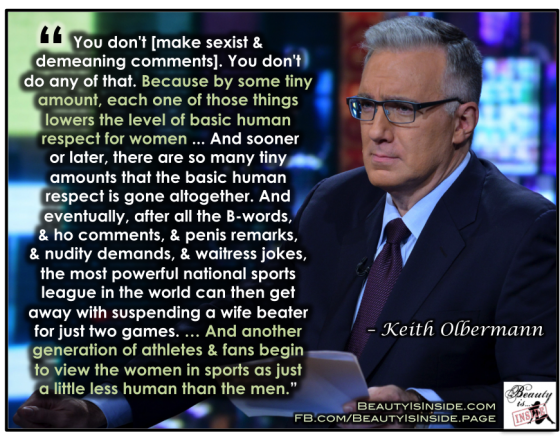
Adult Supervision?
A Facebook friend posted the original version, so I decided to fix it.
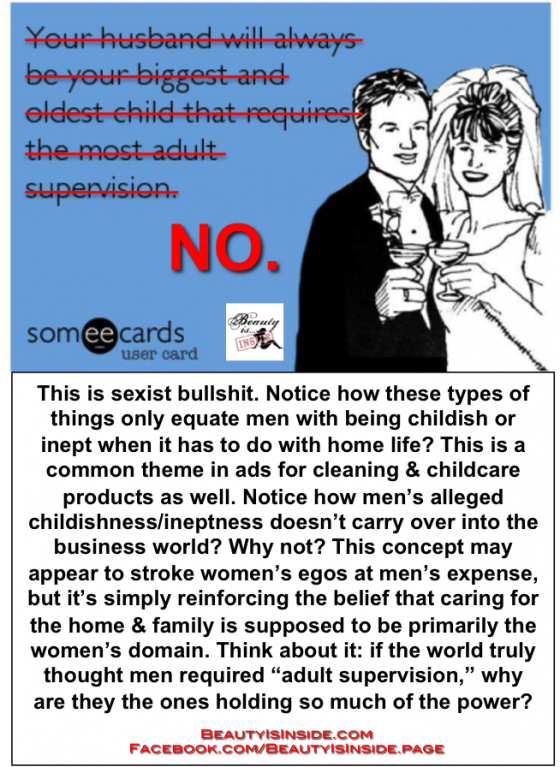
If Men Posed Like Women Do
The media's treatment of women as sex objects is a ubiquitous fact of life. Advertisements, fashion spreads, comic books, movie posters -- nearly everywhere you look, women are shown in various stages of undress and posed in positions that make them look vulnerable, submissive, and sexually available. Conversely, men are depicted in positions of power or dominance, e.g., standing while a woman is reclining, being fully clothed while she's undressed, etc. These differences reinforce inequality between the sexes. Really, how powerful can a woman feel when she's half-naked and awkwardly contorted?
It's an interesting social experiment to see what happens when men are placed in these typical "female" poses.
The image below features two Vanity Fair covers: the top one with fully-clothed fashion designer Tom Ford, along with a nude Keira Knightley and Scarlett Johansson; and the bottom one is a Vanity Fair spoof of their own cover with a fully-clothed Paul Rudd and a pretend-nude Seth Rogen, Jonah Hill, and Jason Segel. In a separate issue, Vanity Fair also did a photo spread with comedians Kristen Wiig, Maya Rudolph, and Tina Fey, but posed them as typical sex objects. As Entertainment Weekly asks, would it be "... just as uproarious if some of those ladies vamped ironically in body stockings[?] ... Men being objectified is so silly as to be hilarious, but it’s better if funny women are also hot."
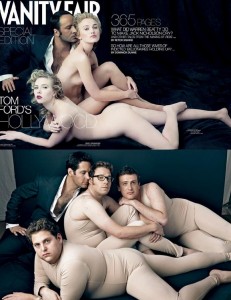
Here's a similar set of images showing nude female models huddled together and then one with the guys from the "Jackass" TV series and movies: 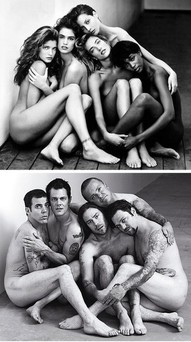
The following "men-ups" were created by photographer Rion Sabean to parody classic pin-up poses. According to Rion, his work focuses on "... gender and sexuality, wherein I attempt to bring light to the scrutiny and judgments of a society that defines human beings under rigid, antiquated terms."



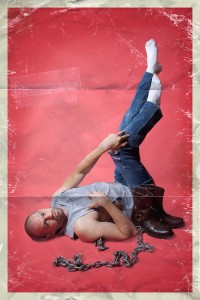


Artist Paul Richmond created a similar series from a gay male perspective. "I began the Cheesecake Boys series to rectify the inequalities in the underwear-flashing art genre known as pin-up," said Richmond.
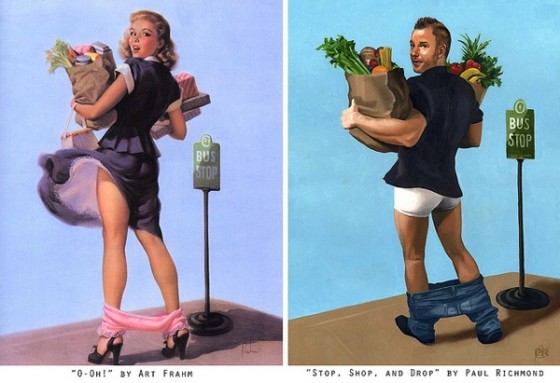
Here's Richmond explaining how he came up with the concept, along with more examples of his work:
Fantasy author Jim Hines parodied women's poses on the covers of fantasy novels by trying to replicate the poses himself. (He also did a series posing like the men on romance novel covers). "... [M]ost of these covers are supposed to convey strong, sexy heroines, but these are not poses that suggest strength. You can’t fight from these stances. I could barely even walk," said Hines.
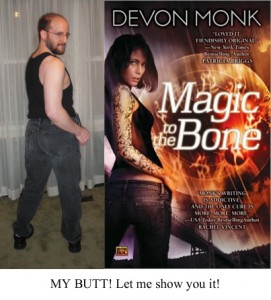
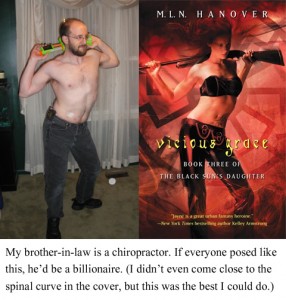
Appearance Comments Can Hurt Her Success
Calling professional women "good looking" can be damaging to their careers. This survey conducted by the Name It Change It campaign by the Women's Media Center shows why:
"In the survey, Jane Smith and Dan Jones are pitted against each other in a race for Congress. Both have similar backgrounds, and after reading their bios the survey respondents prefer Jane slightly, 49-48.
"Then they read a second story. In one version of the story, there's no physical description of either candidate, and Jane's lead stays pretty much the same. In a second version, there's a neutral description of Jane's appearance. Suddenly she's 5 points behind Dan. In a third version, there's a positive description of her appearance. Now she's 13 points behind Dan. A fourth version that contains a negative description has about the same effect.
"In other words, any description hurts Jane. And any non-neutral description, even a positive one, just kills her. This is why even a complimentary comment ... is both inappropriate and damaging in a professional setting. It primes people to think of a woman's appearance, and that's apparently enough to keep them from thinking about her actual qualifications. You will be unsurprised to learn that this effect is strongest among men."
Read more at Mother Jones.
All I Want for Christmas Is Less of this Crap
Recently, I posted the cover of 1994's Sports Illustrated Swimsuit Issue. While still thin, the models looked untouched by Photoshopped and not as perfectly flawless as the cover images of today. Here's another comparison from 1994 -- check out the striking differences between Mariah Carey's "All I Want for Christmas is You" music video from 1994 and the re-make from 2011. As you'll notice, "... the comparison reveals two trends: the rising emphasis placed on consumption and the new hyper-sexualization."
Here's the original 1994 version. As Sociological Images notes:"The first video involves Mariah mostly bounding around in the snow in a snow suit. Often acting pretty darn goofy, with dogs and Santa. She spends part of the video inside with kids, a Christmas tree, presents, and more animals. She’s usually wearing a sweater. She spends less than (I’m guessing) 10 seconds of the video in a sexy Mrs. Claus outfit and, when she’s wearing it, it looks like she’s got long johns on her legs."
And here's the new version for 2011. In the new video:
"Instead of a snowy field or an intimate home, the video takes place in a shopping mall. It centrally features a Nintendo product. Likewise, instead of bounding around in the snow like a goof, she spends the entire video up against a wall in super high heels and the sexy Mrs. Claus outfit (except this one doesn’t have sleeves or a midriff). At one point she runs her hand down her body, touching her breast and moving down to her crotch; at another she just leans against the wall with her back to us and swings her butt back and forth."
“Perfect”
We see photos like this all the time in the media. Many of us compare our "flawed" bodies with the model's seemingly "perfect" one, & then feel like crap. But here's a reality check that shows how this model morphed into "perfect":
1) nose narrowed
2) breasts enlarged & brought closer together
3) protruding ribs removed
4) waist narrowed
5) belly pooch flattened
6) skintone lightened & smoothed out
7) hips made curvier
8) inner thighs slimmed
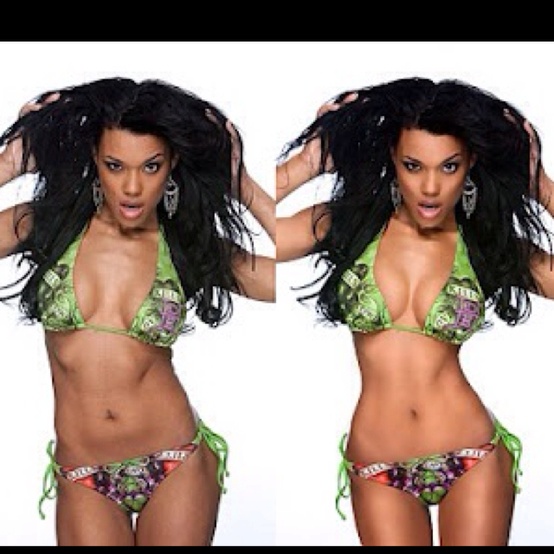
Can They Talk?
 Douche of the Day:
Douche of the Day:
Fox News host Brian Kilmeade said on his radio show today "... that the way he and his network pick out female hosts is, 'we go into the Victoria’s Secret catalogue and we said, ‘Can any of these people talk?’"
Listen to it here.
Keeping Up with Limited Options
In a new study conducted by USC Annenberg and the Geena Davis Institute on Gender in Media, researchers looked at the way women are portrayed in the media. They analyzed nearly 12,000 speaking roles on prime-time TV and in children's TV shows and family films, studying "female characters' occupations, attire, body size and whether they spoke or not."
The results were pretty depressing:The team's data showed that on prime-time television, 44.3 percent of females were gainfully employed -- compared with 54.5 percent of males. Women across the board were more likely to be shown wearing sexy attire or exposing some skin, and body size trends were apparent: 'Across both prime time and family films, teenaged females are the most likely to be depicted thin.' ... Perhaps most telling are the percentages of speaking female characters in each media form: only 28.3 percent of characters in family films, 30.8 percent of characters in children's shows, and 38.9 percent of characters on prime time television were women.
... [R]esearchers reported that they found a lack of aspirational female role models in all three media categories, and cited five main observations: female characters are sidelined, women are stereotyped and sexualized, a clear employment imbalance exists, women on TV come up against a glass ceiling, and there are not enough female characters working in STEM [science, technology, engineering, math] fields."
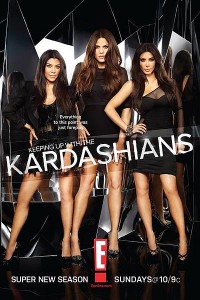
Media messages reinforce sexist attitudes about what women are capable of achieving. As this study shows, female characters are significantly limited in the roles they play -- they're often relegated to supporting roles, as characters less central to the plot, and as sex objects. This impacts how girls grow up feeling about their own abilities and what opportunities are open to them, and it also affects how boys learn to view girls -- who gets to be the star, who gets to be the boss, and who's supposed to just sit there and look pretty:
"Both young girls and boys should see female decision-makers, political leaders, managers, and scientists as the norm, not the exception. By increasing the number and diversity of female leaders and role models on screen, content creators may affect the ambitions and career aspirations of girls and young women domestically and internationally."
Read more about the study at Huffington Post.
Tailoring Your Reality
A woman recounts a story about a friend's experience winning a free style consultation with Clinton Kelly from the TLC show "What Not to Wear". The friend wore a plus-size and had a hard time finding clothes that fit her well. She assumed that it was because of her size, but she couldn't seem to get good results even when she tried to follow plus-size fashion tips from the show. She asked Clinton what she was doing wrong, and he shared this secret:
"His answer was that everything you will ever see on a celebrity’s body, including their outfits when they’re out and about and they just get caught by a paparazzo, has been tailored, and the same goes for everything on What Not To Wear. Jeans, blazers, dresses - everything right down to plain t-shirts and camisoles. He pointed out that historically, up until the last few generations, the vast majority of people either made their own clothing or had their clothing made by tailors and seamstresses. You had your clothing made to accommodate the measurements of your individual body, and then you moved the fuck on. Nothing on the show or in People magazine is off the rack and unaltered. He said that what they do is ignore the actual size numbers on the tags, find something that fits an individual’s widest place, and then have it completely altered to fit. That’s how celebrities have jeans that magically fit them all over, and the rest of us chumps can’t ever find a pair that doesn’t gape here or ride up or slouch down or have about four yards of extra fabric here and there."
Everything is altered. So many of us find fault with our bodies for not fitting the clothes, instead of finding fault with the clothes for not fitting our bodies.
"I sat there after I was told this story, and I really thought about how hard I have worked not to care about the number or the letter on the tag of my clothes, how hard I have tried to just love my body the way it is, and where I’ve succeeded and failed. I thought about all the times I’ve stood in a fitting room and stared up at the lights and bit my lip so hard it bled, just to keep myself from crying about how nothing fits the way it’s supposed to. No one told me that it wasn’t supposed to. I guess I just didn’t know. I was too busy thinking that I was the one that didn’t fit.
I thought about that, and about all the other girls and women out there whose proportions are 'wrong,' who can’t find a good pair of work trousers, who can’t fill a sweater, who feel excluded and freakish and sad and frustrated because they have to go up a size, when really the size doesn’t mean anything and it never, ever did, and this is just another bullshit thing thrown in your path to make you feel shitty about yourself."
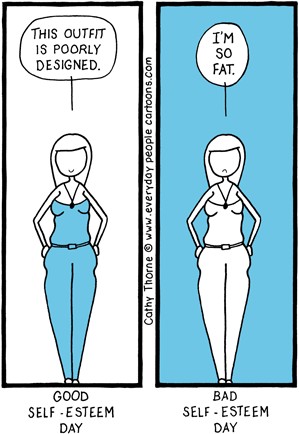
Remind yourself of this helpful little secret the next time nothing in your closet seems to fit. Remind yourself the next time the diet ads start making you think you need to lose weight. Remind yourself when you start feeling fat and ugly and worthless. Because the truth is, the flaws may simply be in your jeans — and not in your genes.
Portia on Body Image
Portia de Rossi, actress and wife of comedian Ellen DeGeneres, struggled with anorexia for years. Her weight hit a low of 82 pounds while filming the TV show Ally McBeal, partly due to entertainment industry pressure to be thin and also due to the shame of hiding her sexual orientation. She wrote her book, Unbearable Lightness, for anyone who's ever struggled with body image.
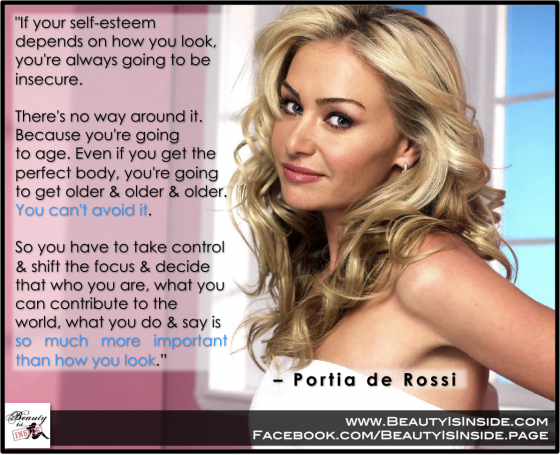
The above quote was from an episode of the brilliant new show, The Conversation with Amanda de Cadenet, which airs on Lifetime. Watch a clip from the show here:
Get Over It
"You are working with a fat girl. Know it now and get over it. ... They need a reminder sometimes that I don't belong to them. It's my body. ... My body can't put anyone in jeopardy of not making money anymore. My body is just not on the table that way anymore."
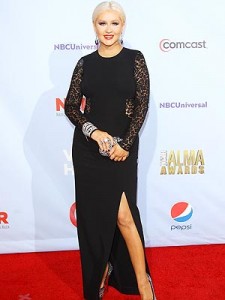
If Men Posed Like Women …
The media's treatment of women as sex objects is a ubiquitous fact of life. Advertisements, fashion spreads, comic books, movie posters -- nearly everywhere you look, women are shown in various stages of undress and posed in positions that make them look vulnerable, submissive, and sexually available. Conversely, men are depicted in positions of power or dominance, e.g., standing while a woman is reclining, being fully clothed while she's undressed, etc. These differences reinforce inequality between the sexes. Really, how powerful can a woman feel when she's half-naked and awkwardly contorted?
It's an interesting social experiment to see what happens when men are placed in these typical "female" poses.
The image below features two Vanity Fair covers: the top one with fully-clothed fashion designer Tom Ford, along with a nude Keira Knightley and Scarlett Johansson; and the bottom one is a Vanity Fair spoof of their own cover with a fully-clothed Paul Rudd and a pretend-nude Seth Rogen, Jonah Hill, and Jason Segel. In a separate issue, Vanity Fair also did a photo spread with comedians Kristen Wiig, Maya Rudolph, and Tina Fey, but posed them as typical sex objects. As Entertainment Weekly asks, would it be "... just as uproarious if some of those ladies vamped ironically in body stockings[?] ... Men being objectified is so silly as to be hilarious, but it’s better if funny women are also hot."

Here's a similar set of images showing nude female models huddled together and then one with the guys from the "Jackass" TV series and movies: 
The following "men-ups" were created by photographer Rion Sabean to parody classic pin-up poses. According to Rion, his work focuses on "... gender and sexuality, wherein I attempt to bring light to the scrutiny and judgments of a society that defines human beings under rigid, antiquated terms."






Artist Paul Richmond created a similar series from a gay male perspective. "I began the Cheesecake Boys series to rectify the inequalities in the underwear-flashing art genre known as pin-up," said Richmond.

Here's Richmond explaining how he came up with the concept, along with more examples of his work:
Fantasy author Jim Hines parodied women's poses on the covers of fantasy novels by trying to replicate the poses himself. (He also did a series posing like the men on romance novel covers). "... [M]ost of these covers are supposed to convey strong, sexy heroines, but these are not poses that suggest strength. You can’t fight from these stances. I could barely even walk," said Hines.


A Woman’s Declaration of Independence
The following is an excerpt from the upcoming book -- If Beauty Is inside, Why Do We Hate Our Guts?: Pop Culture, Sexism, & Body Image. Read the first chapter here.
It's time to declare independence, to separate ourselves from the bad habits, the stifling expectations, and the negative messages that no longer serve us (assuming they ever did).
It's time to declare independence from media messages that tell us we're ugly if we don't look like the "flawless" images of celebrities on the screen and in the magazines. It's time to stop buying into the manipulation and stop wasting time trying to chase an illusion that doesn't even exist.
It's time to declare independence from the belief that having the perfect body will make us worthy of love and respect. We're already worthy of love and respect in the bodies we have now -- no amount of weight loss or plastic surgery will increase our value.
It's time to declare independence from dieting, from deprivation, from seeing food as the enemy. The American weight loss industry makes nearly $60 billion a year trying to convince us that we're not good enough -- if diets worked, would they be this profitable? It's time to stop contributing to their false sense of hope.
It's time to declare independence from body loathing, from looking at our bodies with disgust instead of love. It's time to appreciate all of the amazing things they do for us -- the jiggly arms that give great hugs, the flabby thighs that carry us through the park, the droopy breasts that fed a child, the wounded heart that still knows how to love, the exhausted brain that still manages to tell our lungs to breathe.
It's time to declare independence from spending so much time, energy, and money trying to fit into someone else's idea of whom we should be. It's time to put ourselves first, to focus on our own desires and do what we want instead of what's expected of us. It's time to trust our instincts and become someone we're proud of.
It's time to declare independence from shame, from the belief that we're not good enough, not beautiful enough, not thin enough, not smart enough, not clever enough, not sexy enough. It's time to declare that we are already enough -- that we are perfectly imperfect exactly as we are.
It's time to declare independence from the oppressive labels of virgin or whore, straight or gay. Our sexuality does not define us. It can't possibly define what kind of person we are or what's in our hearts or our minds. Any attempt by others to claim otherwise is an attempt to control us, to police our behavior, and to shame us so that they don't have to examine their own ignorance and fear.
It's time to declare independence from the belief that we can bring sexual assault upon ourselves based on how provocatively we're dressed, how flirty we act, or how drunk we get. The only person responsible for a rapist's behavior is the rapist himself. We have a right to feel safe in the world.
It's time to declare independence from legislators who think the female body should be controlled by wealthy, middle-aged, white, conservative men. Our bodies belong to us -- it's time to declare our freedom to make our own decisions about them. Because if we cannot, then we are truly not equal citizens and this country as not as free it claims to be.
It's time to declare our independence from any force that tries to hold us down -- especially those forces that limit us from within.
Courage to be Real Campaign
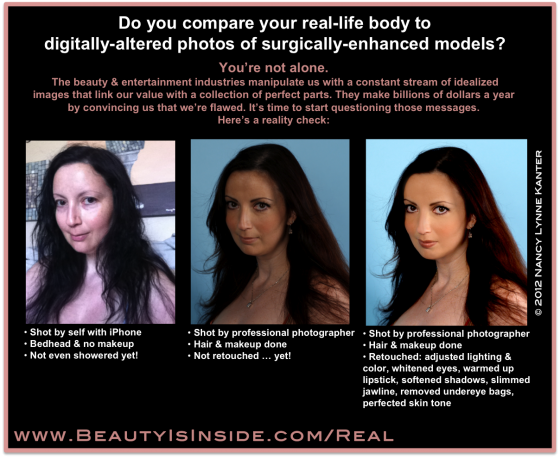
This is me. Don't think for one second that posting a picture of myself with dirty hair, no makeup, and in unflattering lighting didn't take some ovaries! Like many women, I've struggled with not feeling pretty enough, thin enough, perfect enough. I'll be the first to admit that I think I look the best in the photo on the right. It's the photo I use on the back of my book and on the About Me page of this website. I am definitely a product of our beauty-obsessed culture. But this is also me sacrificing my vanity for the greater good. How can I talk about body acceptance and the need to fight against sexist and oppressive imagery if I'm not being real with myself? It takes courage to be real. So everyone, this is what I look like in the morning. Deal with it.
The media manufacture female insecurity for profit. They invent flaws in our appearance and pressure us to fix them. They segment the female body as if it were a bucket of chicken -- we're just legs and breasts and thighs. They convince us that our bodies are too meaty and fatty, our skin is too greasy, and our hair is too fried. They manipulate us with idealized images of hot chicks who were perfected by plastic surgeons, injectable facial fillers and paralyzers, professional photographers, makeup artists, special lighting, hair stylists, fashion designers, and finally photoshopping. And then we compare our real selves with this illusion. It's not a fair fight.
A woman's appearance is always treated as relevant. Tabloids critique female celebrities for gaining weight or having the "worst beach body". The Playmate of the Year is featured on the evening news. Political commentators assess female candidates' appearance almost as much as their political beliefs. We're trained to think that our sexuality is our primary source of power. I discuss this in my upcoming book, If Beauty Is Inside, Why Do We Hate Our Guts?: Pop Culture, Sexism, & Power. In the recent documentary Miss Representation, the filmmaker also examines how our culture's sexualization of women actually minimizes our power in society. Just think about it -- if the most powerful women in the country are reduced to their looks, how can any of us expect to be treated with respect?
It starts with respecting ourselves and having the courage to be real. We have to stop allowing the media to define us in such a superficial and demeaning way. When we pull back the curtain, we see that the sculpted and perfected illusion is just a real woman who has more in common with us than we think.
I wasn't exactly excited to share my naked face with the Internet, but I put together the above image so that you could see the reality behind the special effects. I'd love to see models and celebrities do the same, but their careers depend on them maintaining the illusion. So for now, maybe it'll just be up to us regular women. And that brings us to Beauty Is Inside's new "Courage to be Real" Campaign!
The "Courage to be Real" Campaign is about cracking the illusion of perfection that makes us hate our bodies and compete with each other. I challenge you to be courageous and send in "before and after" photos of yourselves, along with what was manipulated in the "after" photo. Send your photos to real@beautyisinside.com. I'll collect them all in a photo gallery on this site, and I'll also post them on the Beauty Is Inside Facebook page and on Twitter @_BeautyIsInside.
Come on -- if I did it, so can you! Together, we can inspire other women and girls to have the courage to be real themselves.
Purple Paper Project
I'm pleased to announce my new "ad campaign" -- introducing the "Purple Paper Project"! For this project, I'll be critiquing offensive advertising messages with the help of little purple papers and a little snark. Each new ad will be posted here on my blog, and I'll compile them together in the "Purple Paper Project" tab in the right sidebar.
We see about 3000 advertising messages everyday. Even when we're not paying attention, they're always in the background. Cumulatively, these messages affect how we feel about ourselves. In so many ways, they tell us we're too fat, our skin looks like crap, and our house is a mess. They teach us what society expects of us -- and how we're not measuring up. They play on our insecurities, and even invent new ones for us to obsess over (cankles, anyone?). But don't worry, because they're sure to have a product or service that can fix our "flaws"! How very convenient!
The more I started paying attention to these messages, the more I realized how manipulative, insulting, and sexist they were. And I also realized that I was buying right into them. Maybe I did need to lose weight, improve my skin, and clean my house more thoroughly.
Or maybe my weight, skin, and house were just fine the way they were.
Advertising is a one-way form of communication in which powerful corporations try to persuade us to spend our money by manipulating our insecurity. The "Purple Paper Project" is about turning this into a two-way conversation. Consumers have powerful voices too, and it's about time that we started talking back.
To kick this project off, here's an ad from Viva paper towels:

SLUT: See Limbaugh, Unevolved Troglodyte
Rush Limbaugh has been all over the news since his misogynistic rant about Sandra Fluke, the Georgetown University law student who testified before Democratic members of Congress about birth control coverage being a necessary part of women's health. His rant went on for over three days, during which he called her a "slut" and a "prostitute," along with about 50 other insults. Apparently, each of those insults has now cost him an advertiser, as 50 of them (so far) have pulled their ads from his show. Granted, one must wonder why they ever decided to advertise with him in the first place. As a man who regularly spews sexist manure and the one who coined the term "feminazi," it's obviously not his first sexist rodeo. However, this time enough people grabbed the bully by the horns and put pressure on his advertisers to try to make it his last.
After several advertisers initially dropped him, he made a half-assed apology to Fluke, during which he just reiterated what he'd previously said. At that point, you'd think he might slither away from sexist rhetoric until the heat went down ... but nope. Just last week, he made demeaning comments about author Tracie McMillan, including calling her an "authorette" and stating: "What is it with all these overeducated white women?"
Actually, what is it with all these sexist and ignorant old white men? Clearly he's threatened by "overeducated white women" and "feminazis" -- and rightly so. We tend to think women should be treated with respect and fairness. And when we're called things like "slut," "prostitute," "overeducated," and "feminazi" by a cave-dwelling radio personality, we're likely to call him on his shit.

The most disturbing thing about Limbaugh's vile comments are that he isn't alone. Attitudes such as his underlie legislative and religious efforts to politicize our reproductive health and police our sexuality, and they also underlie violence against women in general. It's all about control. The attacks on reproductive rights aren't even about birth control -- they're about woman control. And words like slut are used to shame us, silence us, and put us back in our places.
One thing that cave-dwelling troglodytes are good at is lighting fires. And Limbaugh certainly lit a big one this time.
Referring to a woman as a "slut" and a "prostitute" for sharing her beliefs about birth control, saying that ”she wants you and me and the taxpayers to pay her to have sex” and that she should post a sex video as repayment -- these statements aren't merely the sexist tirades of a bloated blowhard -- these are inflammatory comments on a grander  scale. They contribute to a culture in which demeaning women is normalized. He's fueling the fires of those who share his misogynistic views, fueling their anger toward women for being immoral sluts because they dare to have sex without shame. He's fueling the justifications of those who see women as sexual objects who owe them sex. He's fueling the anger at women who dare to turn down sexual advances. He's fueling the claims that women ask to be harassed or raped because of how they act or dress. These words fuel the fires of those who share the opinion that women should have no voice, that we should be silenced so that we can't challenge their dominance. These are the beliefs underlying the verbal attacks by trolls on online comment boards when a woman dares to speak her mind. And these attitudes are the beliefs underlying more severe misogyny.
scale. They contribute to a culture in which demeaning women is normalized. He's fueling the fires of those who share his misogynistic views, fueling their anger toward women for being immoral sluts because they dare to have sex without shame. He's fueling the justifications of those who see women as sexual objects who owe them sex. He's fueling the anger at women who dare to turn down sexual advances. He's fueling the claims that women ask to be harassed or raped because of how they act or dress. These words fuel the fires of those who share the opinion that women should have no voice, that we should be silenced so that we can't challenge their dominance. These are the beliefs underlying the verbal attacks by trolls on online comment boards when a woman dares to speak her mind. And these attitudes are the beliefs underlying more severe misogyny.
These words aren't uttered in a vacuum. Especially when they're uttered by a media personality with millions of like-minded viewers. Violent actions are precipitated by violent beliefs. In the same way that a disease epidemic affects the weakest members of society first, so does inflammatory rhetoric. Limbaugh reinforces the beliefs of those listeners who share his sexist views; those who have anger issues, antisocial personalities, or other psychological disorders may indeed act out that misogyny. His words fuel their beliefs and their justifications for treating women as objectified less-than-human beings. Thousands of women in this country are physically and sexually assaulted not only by strangers, but also by men they know, including their own partners. Men who see women as equals and deserving of respect do not generally beat and rape women. They also don't call us sluts or prostitutes or try to control our bodies.
A disturbed person may be the one who ultimately lights the match, but vile-hate-spewing-"entertainers" like Limbaugh are the ones providing the gasoline. And both need to be extinguished.
Super Sexism – Not Buying It
Unlike most commercials, those that air during the Super Bowl are ones that people actually want to watch. These $3.5-million-per-30-second-time-slots can be opportunities for companies to be clever, maybe even inspiring ... but instead, many insist on falling back on lazy and uninspired sexist clichés. This is so expected in fact, that MissRepresentation.org, a campaign named after the brilliant documentary film, asked viewers to call out these companies on Twitter with the hashtag #notbuyingit.
Here are the 5 worst offenders, followed by a sampling of You Tube comments that show how sexist messages reinforce viewers' own sexist beliefs:
1) Teleflora -- In what seems more like a Victoria's Secret ad than an ad for a florist, a Victoria's Secret model explains to guys that purchasing a few stargazer lilies is enough to make a girl feel obligated to have sex:
And here are a few comments from enlightened viewers (typos left intact):


- • "It would be so cool to watch a bunch of fat ugly women, chowing down on chips, burgers and fries while they watched this commercial. Those hogs would be spewed out chewed food swearing at the tv. And fat ugly chicks care to comment on this? And how did you react?"
2) Fiat -- In this rarely-used cliché, an attractive woman inexplicably seduces an unattractive geek. She apparently finds being eye-groped a turn-on. I know that I totally wanted to do the last creeper who eye-groped me on the street. I mean what girl wouldn't?
And a few comments:
- • "Insecure and/or ugly chicks tend call things 'sexist'. Lighten up."
- • "if i buy that car i'll ride it hard:)"
- • "This commercial gets 4 boners out of 5. There is nothing more sensual and intriguing than foreign women. American women are so one dimensional, this one is amazing. European and Latin women are the best in the world. American women are total crap!" (48 thumbs up)
3) NFL -- Here's the super-original fantasy of having a bunch of nearly-nude fembots mindlessly standing at attention in the background in case they're needed to fulfill the sexual fantasies of average-Joe-millionaires.
And a couple of comments:
- • "great ad David! big pimpin!!"
- • "Expansive girls can be had pretty cheap actually."
4) Go Daddy (shocking, I know!) -- Judging by their consistently pervy Super Bowl commercials, you'd think Joe Francis was somehow behind it all. Not sure what half-naked girls gone wild have to do with web-hosting, unless Go Daddy is the go-to web host for porn sites.
Here's a comment that's actually critical of the ad:
And these two commenters quickly put her in her place:
- • "sexist douche bags run this company and the ads are almost always sexist. Jillian Michaels has lost any self respect as a woman by working with these tools"
- • "Oh Stfu.. Your just mad cause you look like shit so you start calling people "sexist" because of their commericals just stfu and sit down.. They have a Job I don't see them complaining about it.."
- • "You in the Kitchen?"
5) M&Ms -- And last, but not least sexist, and also oddly ironic ... we're introduced to Ms. Brown, an intelligent and articulate female M&M who voices her annoyance at being treated as eye candy, but whose objection gets shut down by an idiot:
Sigh. We feel your frustration, Ms. Brown M&M. We really do.
Don’t Cha Trust Her
I found this stylish top in the Junior's section. Now why would a girl want to wear something like this? To display how competitive and untrustworthy she is? Or just to be mean and bitchy?
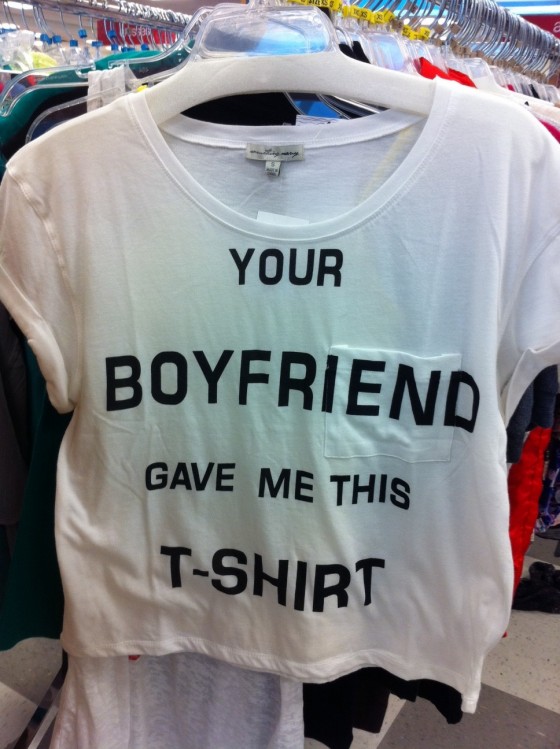
When I saw this t-shirt, I was immediately reminded of the song "Don't Cha" by the Pussycat Dolls. Granted, with their highly-sexualized image, the Pussycat Dolls are hardly models of progress, so lyrics such as theirs should come as no surprise. In case you haven't heard the song, here's the chorus: Don't cha wish your girlfriend was hot like me? Don't cha wish your girlfriend was a freak like me? Don't cha, don't cha, baby Don't cha wish your girlfriend was raw like me? Don't cha wish your girlfriend was fun like me? Don't cha, don't cha
Pop culture seems to treat petty competitiveness and insults as part of being female. The idiotic t-shirts, the man-stealing songs, the catty reality show contestants, the magazine articles about "What Makes Men Cheat?" -- they all regularly remind us that other women are threats. Until she proves she's our BFF, she's the enemy or worse -- the frenemy -- so we'd better watch our backs.
Some Bunny Stinks
The Playboy bunny logo has become a part of pop cultural imagery and can be found on hundreds of products, e.g., jewelry, handbags, t-shirts, and bedding. These products aren't just trashy and tacky, but they're subtle examples of how pornography has gone mainstream.
Below is a little something for the guys to remind them that wherever they're from, they can always smell like a dirty old man in a smoking jacket.
Introducing Eau de Douchebag, by Playboy.
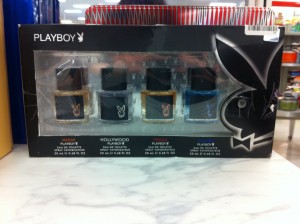 It's a little hard to read, but this collection includes the following four colognes:
It's a little hard to read, but this collection includes the following four colognes:
Miami Playboy -- Inspired by Palm Beach retirees in unbuttoned Tommy Bahama shirts exposing grey hairy chests and gold chains. Has a hint of coconut and Viagra.
Hollywood Playboy -- Inspired by short, balding, beady-eyed sleazebags who prowl Sunset Blvd. and try to get laid by name-dropping and claiming that they're producers. Has a shallow and superficial scent.
Vegas Playboy -- Inspired by married engineering conference attendees who high-five their buddies while getting lap dances and shouting "Vegas baby!" and "What happens in Vegas stays in Vegas!" Has a slight fragrance of stripper sweat and glitter.
Malibu Playboy -- Inspired by homeless 45-year-old surfers who reminisce about their high school glory days and call everyone dude and brah. Has an underlying whiff of rotting seaweed and ocean at low-tide.
Ugly Shade of White
I grew up in the suburbs of Southern California. Early on, I learned that there were subtle rules of what constituted an acceptable skin color in a primarily-white school. And these rules were separate from racial differences -- they were the rules about what white skin was supposed to look like. In my case, I was indeed white. The problem was that I was too white. I was Casper-white, glow-in-the-dark white, butt-white ... the ugly shade of white. To the other kids, my pale skin and dark hair contrasted in a bad way. Where I was from, you were supposed to contrast in a good way, meaning blonde hair and tan (but still white) skin. I got accused of being goth (that's like emo to those of you born a little later); I wasn't, but my corpse-like skin tone was what goth kids dreamed of. The popular kids regularly sneered that I should get a tan, and damn if I didn't try.
 I desperately wanted to be tan, because tan = pretty. Over the years I tried everything. I wore coffee-colored pantyhose under skirts and even shorts(!) on 90-degree days. I sunned myself on towels in my parents' weed-covered backyard. I over-baked in tanning beds until I got bulb-burn-stripes down my body. I broiled in the Acapulco sun like a crustacean on a BBQ until my bright red legs made standing so excruciating that I had to seek medical help. (As I was basting myself with the 0-SPF coconut oil I bought from a beach vendor, a passing woman stopped to tell me how beautiful my light skin was. How ironic.) No matter what method I tried, my skin only managed to turn from white to pink to red. And then ultimately to freckles. I just hope that I won’t develop skin cancer due to my efforts.
I desperately wanted to be tan, because tan = pretty. Over the years I tried everything. I wore coffee-colored pantyhose under skirts and even shorts(!) on 90-degree days. I sunned myself on towels in my parents' weed-covered backyard. I over-baked in tanning beds until I got bulb-burn-stripes down my body. I broiled in the Acapulco sun like a crustacean on a BBQ until my bright red legs made standing so excruciating that I had to seek medical help. (As I was basting myself with the 0-SPF coconut oil I bought from a beach vendor, a passing woman stopped to tell me how beautiful my light skin was. How ironic.) No matter what method I tried, my skin only managed to turn from white to pink to red. And then ultimately to freckles. I just hope that I won’t develop skin cancer due to my efforts.
I've since given up on achieving that sun-kissed look. The sun never even hugged me, no matter how hard I chased. Apparently, he was just not that into me. He always made promises like a big tease, and then ended up burning me over and over again. Trust me -- the sun's not that hot. Even if he fulfills his promise of a glowing tan, you'd better get yourself checked out. No one wants to bring home an outbreak of melanoma. Since I kicked the sun to the clouds, I use alternative methods of tanning. I now slather or spray stinky-smelling and streaky tanning shit. Or I just wear pants or a maxi-dress. (And that way, I don't even have to shave.)
It hurt to be judged for being too white, and I absorbed the criticisms as much as I did the damaging rays. No girl wants to feel ugly.
Women all across the skin color spectrum are affected by beauty standards. These standards come from both the dominant culture, as well as from each minority group within. In the Hispanic culture, skin that's "too dark" isn't generally considered attractive. Darker skin indicates more Indigenous blood than the preferable Spanish European blood. I've heard several people comment about the good-looking gueros (light-skinned males and females). I've heard women gossip about their friend's new baby: "Mira la morenita, la pobrecita" (Look at the little dark one, the poor thing). The telenovelas (soap operas) popular on Spanish television channels primarily feature light-skinned actors. Skin color doesn't just matter outside of their community -- it also matters within.
In the soon-to-be-released documentary, "Dark Girls," the filmmakers examine how attitudes about skin color affect women. They focused on dark-skinned African-American women, but as I watched the preview below, I could empathize with the self-disdain. One woman talks about how she felt about her skin as a little girl: "I can remember being in the bathtub asking my mom to put bleach in the water so that my skin would be lighter and so that I could escape the feelings I had about not being as beautiful, as acceptable, as lovable."
We can't control how others treat us, but we can control the way we treat ourselves. Why do we keep trying to find ways to separate and judge ourselves? I was teased about being too white, so I learned to view my white skin with disdain. It's sad enough that darker-skinned minorities are discriminated against by whites based on skin color, but even sadder that some would do the same to themselves. Please note that I am not saying that being "too white" is at all comparable to the racism experienced by people for being "too dark." The only aspect I'm comparing pertains to beauty standards. Clearly, there is a long and painful history of racism and discrimination in our country. What I can relate to is how it felt to be a little girl who thought she wasn't pretty enough because her peers judged her based on an arbitrary rule about the amount of melanin in her skin. If I could've added self-tanner to my bathwater as a kid, I would've done it.
It's heartbreaking to think that an innocent little girl would feel so ugly that she'd want to add bleach -- or self-tanner -- to her bathwater. But it's also a reminder of how we as women don't need others to hold us down. After awhile, we learn to do it to ourselves.
Chasing the Deep
The media teach us
that our primary goals as women
should be weight loss and the pursuit of beauty,
and this is particularly true of celebrities.
--
Maybe it's time for us all to stop chasing pavements
in that direction
and instead,
start rolling in the deeper goals.
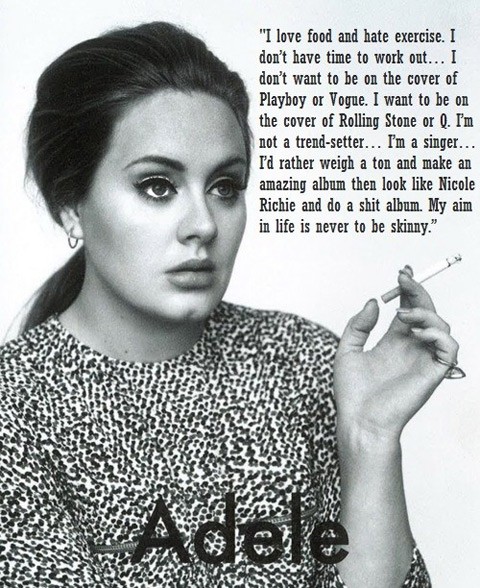
Beauty Magazines Make Us Feel Ugly
In a recent study, researchers found that 100% of women felt bad about their appearance after looking at beauty magazines for just a few minutes. From one of the authors: “Surprisingly, we found that weight was not a factor. Viewing these pictures was just bad for everyone,” said Laurie Mintz, associate professor of education, school and counseling psychology in the MU College of Education. “It had been thought that women who are heavier feel worse than a thinner woman after viewing pictures of the thin ideal in the mass media. The study results do not support that theory."
I happened upon this brilliant way of fighting back. This was part of a campaign by the National Eating Disorder Information Centre (NEDIC) in Canada that targeted beauty magazines. From NEDIC's website: "To involve the public in our campaign, this transit shelter ad appeals to dieters and those who feel the pressure to diet (virtually all women), empowering them with a way to really shed their weight problem."
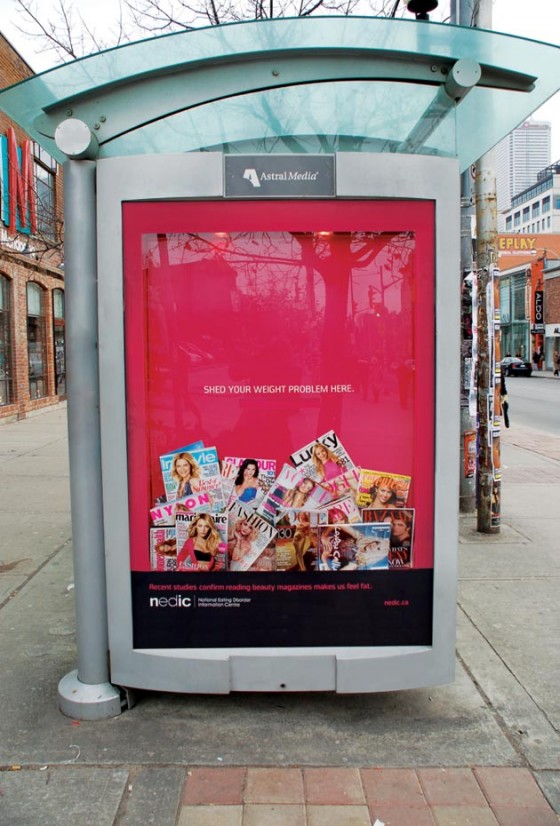
Close-up:
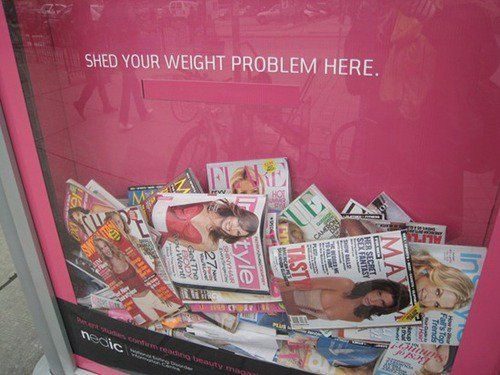
Text at bottom of display:
"Recent studies confirm reading beauty magazines makes us feel fat."
Another study demonstrated "... the role of the media in shaping, rather than merely reflecting, societal perceptions of the female body. Consistent with our hypothesis, it was found that women's body image satisfaction is, indeed, influenced by their exposure to the thin ideal presented in fashion magazines."
(Want more? Here's one of my previous posts on this topic.)
Why the H R they Puff ‘n Stuff?
In a previous post, I discussed how the media create arbitrary flaws in women's bodies, then conveniently offer up solutions to fix those flaws. That post was about ugly armpits. Today's example is about the land down under -- and I don't mean Australia. (I've also written about this flawed area before.) Yesterday, Jezebel posted a clip from the CBS daytime show, "The Doctors," in which they discuss how "Your Aging, Deflated Vagina Is Like A Hamburger." (Well technically, it's your aging, deflated vulva, but let's move on.)
On the show, Dr. Jennifer Berman, expert in the field of female urology and sexual medicine, made her case by explaining how your private parts become less puffy as they succumb to gravity, age, and having babies, and this makes them sag and deflate. She used a hamburger as a pretend vulva. (I guess a taco would've been too tacky.) She held the burger sideways so that the meat patties represented the inner labia minora and the buns were the outer labia majora -- the parts that don't puff enough. (Side note to show producers: On the next show, you could totally add different condiments to the burger in order to discuss a variety of vaginal maladies, e.g., cheese, mayo, ketchup, etc. Just a thought.)
Dr. Berman explained that a procedure called the "Labial Puff" can counteract the sagging and deflating. It entails injecting the outer lips with cosmetic filler, similar to the injections done to the lips on your face. It allegedly helps to revolumize the labia majora -- or in other words -- it puffs your muff.
"Ladies, you're not going to notice it if you're just laying down or sitting down. I actually had to bend over and look under and I swear to God, I almost had a heart attack [insert audience laughter]. And it was subtle, but it was there," she said.
So, let's get this straight. This alleged labial malformation isn't noticeable unless you're bending over and looking under yourself in some sort of mangled yoga pose, right? And not only that, but while you're contorting yourself to search for your most recently discovered fucked up body part, you discover that it's only subtly fucked up? It doesn't hurt or interfere with your sexual function, but it supposedly looks subtly fucked up according to those who have an interest in fixing it. And that alone is a good reason to perform a cosmetic procedure on it? That's what I think is fucked up.
And that, boys and girls, is an example of how the media invent an arbitrary flaw in the female body to create a need, and then serve up a solution to fulfill that need.
The Labial Puff is supposed to make your vulva look more youthful ... some would say even childlike. So here's a question: what about the guys? When boys go through puberty, their testicles drop, and they continue their downward descent as men age. Why don't we hear "The Doctors" make a case for the Sack Lift to make men look more youthful? Like the Labial Puff, it could be just a simple outpatient procedure in which they inject cosmetic fillers to pump up the testicular volume. Then they could do a couple of little snips and stitches to raise them up to a more youthful -- and virile state.
The best part? "The Doctors" could explain the procedure on their show by using a couple of meatballs.
Gaining Losses
We often measure our success as women in numbers -- judging ourselves in terms of pounds, size, and age. Lower numbers indicate success, while higher equal failure. And as such, we’ve developed a counter-intuitive association between losing and gaining. In our worlds, losing equals success and gaining equals failure.
We focus on losing weight, lowering our sizes, taking years off our faces. But consider for a moment how refreshing it would feel to focus on losing the following instead:
insecurity
anxiety/depression
self-critical voice
hopelessness
judging ourselves from the outside in
And instead of worrying about gaining weight, going up in size, or showing years on our faces, how great would it be if we could gain these?:
confidence passion intuitive knowledge joyfulness/hopefulness experiencing ourselves from the inside out
Our culture has taught us the convoluted notion that losing superficial aspects of ourselves like weight will lead to positive internal states like happiness. But then there always seems to be one more step to take, one more improvement to make, one more product to buy. That carrot is continually dangled farther and farther away, making us feel like failures, and drawing us toward that extra slice of carrot cake for temporary relief. This cycle may be self-defeating to us, but it also helps the beauty and diet industries gain billions of dollars in revenue, while losing nothing.
Maybe it’s time to reexamine what losing and gaining really mean.
Do Your Boobs Hang Low?
Please note: This post contains links and video that show female nudity, and even though the images are non-sexual, they're still probably NSFW (unless you're self-employed).
American culture has a prude, yet promiscuous attitude about women's bodies. We shy away from honest and educational discussions about "private" body parts, but at the same time we're exposed to hours of sexually explicit imagery in our media. How many of us have healthy attitudes about our bodies? What does a "normal" woman even look like?
What are "normal-looking" breasts? What is a "normal-looking" vagina? We've seen our own bodies reflected back at us in the mirror, and we may have seen our mothers' or sisters' bodies as we grew up. Otherwise, the most common representations we see belong to actresses, lingerie models, or porn stars, all of whom adhere to a very narrow body standard. When we compare our reflections with those representations, most of us look quite different. Generally, straight women don't get to see many other normal women naked. I would imagine that straight men and lesbians have a greater understanding of the subtle differences in women's bodies than the rest of us.
In my book, I compiled this list of just some of the variations that -- thanks to the media -- we've come to define as flaws. The criteria for determining a body part a flaw just seems to depend on the availability of a "solution" for that flaw. In other words, a part becomes a flaw when there's a product or service that we can buy to fix it. Newly-defined body flaws are new sources of revenue for companies. And we "buy" right into it. We're never okay just as we are -- there's always one more little thing that we can tweak. The more we see images of female perfection in the media, the more we look at our normal bodies with critical eyes.
More and more of us are surgically altering the very parts that make us female -- our breasts and our vulvas -- for no other reason than to fit an arbitrary ideal. I think it's important that we all get a chance to see what non surgically-altered, unretouched women look like. My hope is that if we see the differences and similarities in other real women's bodies, then we can gain a healthier perspective and learn to have a better appreciation for our own bodies.
This website has lots and lots of pictures of breasts -- big ones, small ones, saggy ones, perky ones, post-pregnancy ones, etc. As the site says, "There is enormous variation in what is normal. Sizes and shapes vary enormously. So don't worry, ladies!" The pictures on this site are not objectified images or shots taken without consent. They're user-submitted with faces cropped for anonymity, and they're accompanied by short commentaries from the submitters. Personally, after browsing the images on this site and reading about the women's feelings about their breasts, I had a renewed appreciation for my own.
Documentary filmmaker Lisa Rogers discusses the growing number of women seeking labiaplasty in her film, "The Perfect Vagina." Labiaplasty is a cosmetic procedure in which a surgeon removes the part of the labia minora (inner vaginal lips) that hangs below the outer labia majora. Some women seek out this procedure to alleviate pain and discomfort, but an increasing number of others are getting their lips sliced off so that they can meet the porn star ideal. This thoughtful and educational film discusses our relationship with the most intimate part of our bodies. (Be aware that this film shows a cringe-worthy and graphic scene of a young woman undergoing this surgery.) You can view the entire film here.
In "The Perfect Vagina," Rogers meets with sculptor Jamie McCartney who has made casts of 350 female volunteers' vulvas for his project called "The Great Wall of Vagina" (aka "Design A Vagina"). As McCartney says: "For many women their genitals are a source of shame rather than pride and this piece seeks to redress the balance, showing that everyone is different and everyone is normal. The sculpture comments on the trend for surgery to create the 'perfect' vagina. This modern day equivalent of female genital mutilation is a bizarre practice which suggests that one is better than another."
Here's a short video describing his project:
I believe that educating ourselves about our bodies is empowering. When we feel comfortable in our own skin, we feel more comfortable in navigating the world -- saggy breasts, droopy labia, and all.
Help Hugh Know Who
It appears that just a paltry pack of pervs are still peeping at porn printed in paper pictorials. Is poor Playboy's popularity perhaps ... petering out? What a pity.
Fortunately, an unlikely heroine is taking up the cause! In response to the company's financial difficulties, The Daily Show's Kristen Schaal offers an appeal for donations to the Save the Mansion Fund. As she sweetly says: "Living, breathing women with hopes and dreams are standing by to take your pledge."
| The Daily Show With Jon Stewart | Mon - Thurs 11p / 10c | |||
| Save the Playboy Mansion Fund | ||||
|
||||

